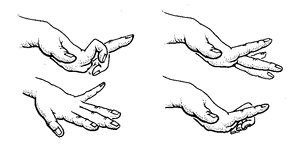Medical term:
athetotic
athetosis
[ath″ĕ-to´sis]repetitive involuntary, slow, sinuous, writhing movements.

Positions of fingers in movements of athetosis. From Dorland's, 2000.
Miller-Keane Encyclopedia and Dictionary of Medicine, Nursing, and Allied Health, Seventh Edition. © 2003 by Saunders, an imprint of Elsevier, Inc. All rights reserved.
ath·e·to·sis
(ath'ĕ-tō'sis),A condition in which there is a constant succession of slow, writhing, involuntary movements of flexion, extension, pronation, and supination of the fingers and hands, and sometimes of the toes and feet. Usually caused by an extrapyramidal lesion.
Synonym(s): extrapyramidal cerebral palsy, Hammond disease
[G. athetos, without position or place]
Farlex Partner Medical Dictionary © Farlex 2012
athetosis
(ăth′ĭ-tō′sĭs)n.
A constant succession of slow, writhing, involuntary movements of flexion, extension, pronation, and supination of fingers and hands, and sometimes of toes and feet.
ath′e·toid′, ath′e·to′sic (-tŏt′ĭk), ath′e·tot′ic (-tŏt′ĭk) adj.
The American Heritage® Medical Dictionary Copyright © 2007, 2004 by Houghton Mifflin Company. Published by Houghton Mifflin Company. All rights reserved.
athetosis
Slow, uncoordinated, involuntary writhing movements (most severe in the fingers, hands, arms, legs and neck), difficulty feeding, hypotonia and spasms; athetosis may be accompanied by cerebral palsy.Aetiology
Lesions in the brain, especially the corpus striatum, due to neonatal jaundice (kernicterus), asphyxia and thalamic stroke.
Management
Most pharmacologic agents (e.g., haloperidol, diazepam, curare and others) are ineffective.
Segen's Medical Dictionary. © 2012 Farlex, Inc. All rights reserved.
athetosis
Mobile spasm Neurology Constant, slow involuntary writhing movements, most severe in hands; A CNS disorder characterized by continual uncoordinated movements of the limbsMcGraw-Hill Concise Dictionary of Modern Medicine. © 2002 by The McGraw-Hill Companies, Inc.
ath·e·to·sis
(ath'ĕ-tō'sis)Slow, writhing, snakelike involuntary movements involving flexion, extension, pronation, and supination of the fingers and hands, and sometimes of the toes and feet as well. Usually caused by an extrapyramidal lesion.
See also: choreathetosis, chorea, dyskinesia, cerebral palsy
Synonym(s): Hammond disease.
See also: choreathetosis, chorea, dyskinesia, cerebral palsy
Synonym(s): Hammond disease.
[G. athetos, without position or place]
Medical Dictionary for the Health Professions and Nursing © Farlex 2012
athetosis
A neurological disorder featuring involuntary, slow writhing movements of the hands, arms, face and tongue caused by a form of CEREBRAL PALSY. The commonest causes are ERYTHROBLASTOSIS FETALIS from rhesus incompatibility and brain lack of oxygen during birth. Intelligence may be unaffected but there is usually severe speech difficulty and the appearance suggests mental retardation to the observer. Seizures are common.Collins Dictionary of Medicine © Robert M. Youngson 2004, 2005
Athetosis
A condition marked by slow, writhing, involuntary muscle movements.
Mentioned in: Cerebral Palsy, Lesch-Nyhan Syndrome
Gale Encyclopedia of Medicine. Copyright 2008 The Gale Group, Inc. All rights reserved.
Hammond,
William A., U.S. neurologist, 1828-1900.Hammond disease - a condition in which there is a constant succession of involuntary movements of the fingers and hands, and sometimes of the toes and feet. Synonym(s): athetosis
Medical Eponyms © Farlex 2012
ath·e·to·sis
(ath'ĕ-tō'sis)A condition involving a constant succession of slow, writhing, involuntary movements of flexion, extension, pronation, and supination of the fingers and hands, and sometimes of the toes and feet.
[G. athetos, without position or place]
Medical Dictionary for the Dental Professions © Farlex 2012
Latest Searches:
Voraxaze - Voranil - Voorhoeve - voodoo - VOO - Vontrol - von - vomitus - vomiturition - vomitory - vomitoria - vomito - vomitive - vomiting - vomit - vomica - vomerovaginalis - vomerovaginal - vomerorostralis - vomerorostral -
- Service manuals - MBI Corp